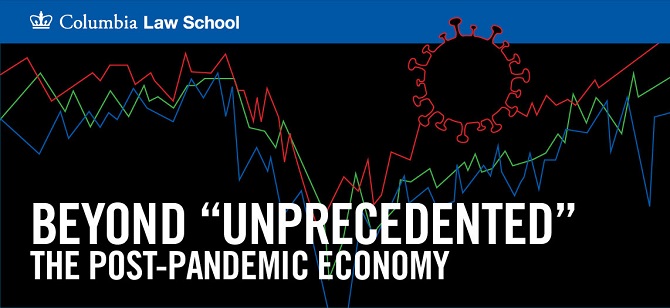
Beyond "Unprecedented" S1 Ep1: Essential – and Broke
Loading...
Files
Download Transcript - Beyond "Unprecedented" S1 Ep1: Essential – and Broke (392 KB)
Document Type
Podcast
Publication Year
2020
Description
The pandemic has brought with it financial and emotional stress for tens of millions of Americans. Will the global health crisis cement what Professor Katharina Pistor calls “feudal type of levels of economic inequality,” or will it be an opportunity to reshape wealth distribution in the United States?
In the first episode of Beyond “Unprecedented,” host Eric Talley welcomes Pistor and Professor Michael Graetz, both authors of recent books that examine the foundations of economic inequality, to discuss how U.S. law and public policy favor the wealthy at the expense of the majority of the workforce (employed and unemployed) and potential remedies to create a more just economy.
Disciplines
Banking and Finance Law | Business | Business Organizations Law | Economics | Health Law and Policy | Income Distribution | Labor and Employment Law | Law | Law and Economics | Medicine and Health Sciences | Public Affairs, Public Policy and Public Administration | Public Health | Social and Behavioral Sciences
Center/Program
Ira M. Millstein Center for Global Markets and Corporate Ownership
Recommended Citation
Talley, Eric L.; Pistor, Katharina; and Graetz, Michael J., "Beyond "Unprecedented" S1 Ep1: Essential – and Broke" (2020). Beyond Unprecedented Season 1. 2.
https://scholarship.law.columbia.edu/beyond_unprecedented/2



Episode Details
Released: October 6, 2020
Length: 25:00
Featuring:
Katharina Pistor is Edwin B. Parker Professor of Comparative Law at Columbia Law School, where she teaches corporations, law and development, and law and finance in theory and practice. Her most recent book, The Code of Capital: How the Law Creates Wealth and Inequality, was named one of the best books in 2019 by the Financial Times. In it, Pistor, explains the legal structures by which “ordinary” assets – land, private debt, business organizations, knowledge – are transformed into capital and wealth that are protected by legal rights bestowed by the government. She has degrees from the University of Munich, University of London, University of Freiberg, and the John F. Kennedy School of Government at Harvard University.
Michael J. Graetz is Columbia Alumni Professor of Tax Law. He was assistant to the secretary and special counsel for the Department of the Treasury, and before joining the Columbia law faculty he taught at Yale Law School for 25 years. His recent scholarship has focused on U.S. legal history and problems around economic insecurity and inequality. In his new book, The Wolf at the Door: The Menace of Economic Insecurity and How to Fight It (with Ian Shapiro), he proposes realistic policy solutions and strategies to confront insecurity and writes about how the globalization of the workforce, outsourcing, and technological advances pre-pandemic led to millions of people losing their jobs and to financial hardship, which has been exacerbated by COVID-19. He earned his B.B.A. from Emory University and his LL.B. from the University of Virginia Law School.
Hosted By:
Eric Talley, Isidor and Seville Sulzbacher Professor of Law, writes and researches at the intersection of corporate law, governance, and finance. As a co-director of the Ira M. Millstein Center for Global Markets and Corporate Ownership, Talley shapes research and programs focused on the future of corporate governance and performance. Talley is a frequent commentator in the national media, and he speaks regularly to corporate boards and regulators on issues pertaining to fiduciary duties, governance, and finance. He is a graduate of the University of California, San Diego, and earned his J.D. and Ph.D. in economics from Stanford University.